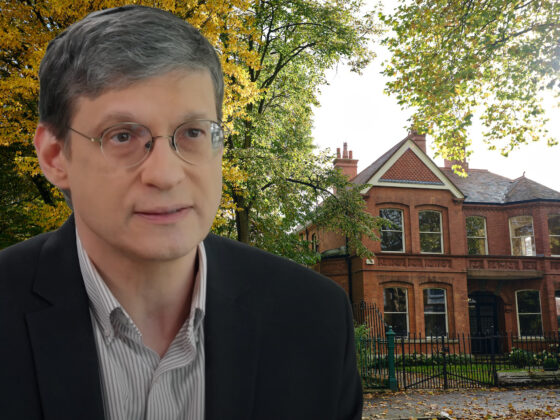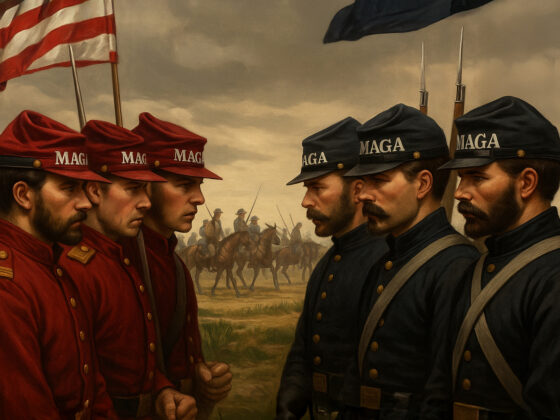In recent years, there has been an ongoing controversy about the origins of currently fashionable social justice ideology. Terms like Cultural Marxism and postmodernism have been used and subjected to sometimes fierce attacks. For an example, take this polemic by Charles Mudede against “the insufferable exemplar of self-sourced self-certainty, Jordan Peterson” who “likely does not read books” and whose “idea of Cultural Marxism Is totally intellectually empty.”
Ignoring the absurdity of suggesting that Peterson does not read books, does this even represent an actual disagreement? Clearly, Mudede’s politics are far from Peterson’s, but his belligerence and the verbose complexity of his reasoning only makes it harder to see where the difference lies.
Not Marxism, but a neoliberalism that found its intellectual force in what Peterson imagines as Cultural Marxism but is, in fact, a post-structuralism that exploded on the scene in the 1970s, was promoted by North American universities, and was vigorously anti-classical Marxism.
Mudede seems to be saying that his imaginings about Peterson’s imaginings about Cultural Marxism correspond to his (Mudede’s) idea of a particular version of post-structuralism. But since he never tells us what specific ideas go into either of these (or neoliberalism), we will just have to trust him on that. Or not.
I have seen similar confrontations many times. If you utter a phrase like “cultural Marxism,” you should expect an avalanche of protest before you finish the sentence.
It seems sensible to minimize such misunderstandings by finding better terms. Helen Pluckrose and James Lindsay have done an admirable job of this in their book Cynical Theories. They describe in detail how postmodern ideas were adapted for activism, and call the result applied postmodernism. That might be the term that comes closest to encapsulating the historical roots of what we now know as “wokeness,” although they also discuss other terms that may be less descriptive but stem from the academic scholars themselves, such as Critical Social Justice as well as Critical Theory including various branches such as Critical Race Theory.
There is a common premise that underlies many of these conversations (or shouting matches): a model of the social dynamics of the ideology in which theorists and thinkers are placed at the center. I propose a radically different (though not contradictory) perspective: putting the needs of activists at the center, and assuming that those needs shape the ideology of the activists. And thus also shaping what the public sees in politics and the media.
The type of activist in question can be identified as radical, revolutionary and utopian. Much of the common conceptual material used by such activists originated with the philosophy of G.W.F. Hegel, who was a decisive influence on Karl Marx in the 19th century and was re-activated by the Neo-Marxists in the 20th century. This passage from The Difficulty with Hegel by Roger Kimball encapsulates some of the essence of this way of thinking:
It is true that Marx devoted many pages to criticizing Hegel’s philosophy. But he firmly embraced Hegel’s view of history as a realm of ineluctable dialectical progress—progress, that is to say, which is necessary, i.e., inevitable, and which proceeds by continuous negation.
This basic idea, known as historicism, recurs both in Marxism, Neo-Marxism and current radical thinking. The progress of history is seen as inevitable and having a utopian endpoint, a goal that will occur as a result of the dialectical process. This differs from the prevailing paradigm in Western democracies, where politics is dominated by a balance between—on the one hand—liberals who push for specific, non-utopian improvements and—on the other—conservatives who hold back because they want to make sure those changes won’t destroy anything of value. In the historicist view, politics instead becomes a struggle between progressives who are on the right side of history and reactionaries who are simply holding us back and therefore have nothing positive to contribute.
These ideas have been handed down intact from the 19th century, so there is a continuous tradition. My contention is that they are maintained and kept, not simply because each generation of thinkers has been influenced by the previous one, but because they are useful to activists. Radical utopian activists need to pursue certain goals in order to have success. They must seek power and status, recruit followers to their cause and then try to persuade the rest of us. These goals are supported by a set of ideas that seem to be fairly constant across time, at least as far back as Karl Marx or the French Revolution. Those ideas can be roughly sorted into four clusters: Power and oppression; revolutionary and utopian; collective identity; and truth and reality.
The Power and Oppression Cluster
The idea most obviously relevant to the task of the activist is power. Anyone who wants to change the world by direct means needs power in some form, legitimate or illegitimate. Radical utopians generally hold that the fundamental dynamic of society is a power struggle between oppressor groups and oppressed groups, aggressors and victims, the privileged and the marginalized. These groups can be defined by class, gender, races, or any of multiple other distinctions. Purporting to represent the oppressed makes power seem more legitimate, more palatable and less self-serving. Followers are more likely to see the leader as a selfless hero rather than as someone greedily indulging his own personal lust for power, money or other benefits.
Dialectics and historicism are useful for this purpose. Dialectics emphasizes contradictions and is seen as a higher form of logic, superior to ordinary scientific and empirical thinking. In Roger Kimball’s words:
This after all is the famous dialectical process whereby each level of development is said to contain its opposite and is aufgehoben…What this Hegelian philosopher’s stone means is that you can eat your contradiction and have it too. “The essence of each thing,” Hegel wrote in his Lectures on the History of Philosophy, “lies in determination, in what is the opposite of itself.” Nice work, if you can get it. Hegel’s dialectic is a universal cognitive solvent; it licenses epistemological anarchy.
This is how it works: on the one hand, in order to be on the right side of history, we must follow through and support the inevitable process rather than resisting it. On the other hand, the outcome of dialectical thinking is indeterminate. As the philosopher of science Karl Popper has said, the dialectical method is “elastic”: “The vagueness of dialectic is another of its dangers. It makes it only too easy to force a dialectic interpretation on all sorts of developments and even on quite different things.” So if I’m a power-seeking person trying to get people to follow me, I can use dialectic to dream up a direction to follow, while making it seem like I am pointing out the only way forward, and that anyone who objects is a reactionary who is impeding the march of history.
The struggle on behalf of the oppressed is seen as a zero-sum game, and thus naturally as adversarial and antagonistic. One man’s loss is another man’s gain. Privilege implies oppression and vice versa. If I’m better off, someone lower in the food chain will suffer. Thus, win-win solutions are typically not emphasized.
This dichotomy is frequently not quite explicit. However, it is explicit in the Marxist concept of exploitation, where workers get less than their fair share of the value of what they produce and the capitalists benefit from this. In this model, all workers are exploited and all capitalists benefit from the exploitation. In other words, this is more than just a statistical difference between the two groups; it applies to every single individual.
In radical feminism, it is more ambiguous. A case in point is Susan Brownmiller’s 1975 book Against Our Will, which asserts that rape is “a conscious process of intimidation by which all men keep all women in a state of fear.” I have read the entire book, looking for an analysis, or at least a superficially logical argument to justify the idea that all men are actively complicit even though only a minority of men are literally rapists. However, I could find no such argument. Still, a plausible interpretation is that all men might be benefiting from this state of affairs, similarly to how in Marxism all capitalists benefit from exploitation. Most people would reject Brownmiller’s claim, noting that men in general don’t seem to want women to fear them, especially since that would likely cause women to avoid men. Nevertheless, Brownmiller’s book has been hugely influential, and so has the idea that men, qua men, possess some magical key to the problem.
The same simplistic link between oppression and privilege is present in today’s Critical Social Justice. In an analysis of the concept of privilege, James Lindsay notes that it has “a pejorative and shaming connotation” and that “privilege operates in a nearly indistinguishable way from the religious concepts of Original Sin and Depravity.” While I agree that it does resemble these religious concepts, it seems to me that most of its moral weight comes from the idea that privilege exists at the expense of marginalized or oppressed groups.
…when academics use the term in describing how society works, they refer to the rights, advantages, and protections enjoyed by some at the expense of and beyond the rights, advantages, and protections available to others…[quoted in the above link]
Let us be clear what this means. According to Merriam-Webster, the phrase “at the expense of” means “in a way that harms (something or someone).” In other words, by being privileged, you are literally harming someone who is less privileged. The flip side of this is the notion that the hardship of the oppressed benefits the privileged. Again, this makes perfect sense in the Marxist theory of exploitation, but less so in the real world where most group differences are not the result of dividing a limited amount of resources between groups. Just as men in general don’t benefit from women being raped, white people in general have nothing to gain from unarmed black people being killed by police.
How far wrong this way of thinking can go is apparent in how Jews, one of the most persecuted groups in history, are now being seen as colluding with white supremacy: “Despite its laudable goal of opposing racism and white supremacy, CRT relies on narratives of greed, appropriation, unmerited privilege, and hidden power — themes strikingly reminiscent of familiar anti-Jewish conspiracy theories.”
The Revolutionary and Utopian Cluster
As mentioned, the (originally Hegelian) historicist view of society implies a utopian state at the end of history. This is intimately related to another concept: revolution. Believers in Utopia compare current conditions to their utopian fantasy which is always vague. By that comparison, they are seen as so deficient as to require a total transformation of society or a “reimagining” of the fundamental principles on which society is based.
Achieving such a transformation is simple in principle, though less so in practice. In essence, all you need is to gather enough people who are willing to do what it takes to “burn down the system” and get to work. The task of recruitment is achieved by convincing people of the absolute horror of the current situation, which is demonstrated by contrast with Utopia and by tricks that enable ever smaller problems to seem large and consequential.
Since the aim is conceptually so simple, people can be brought together with less conflict and friction than when details of goals and plans for improvements have to be worked out in open debate and agreed upon.
Utopian thinking creates a binary distinction with Utopia on one side and the current situation—as well as everything in-between—on the other. Revolutionaries view reforms cynically. To them, reforms have little—or even negative—value unless they hasten the coming of utopia. Reforms can never cure the “fundamental” problem, which is “the system” itself. This leads to an inability to appreciate or even describe gradual progress in the usual sense, since it always remains superficial.
Just as with the power and oppression cluster, revolutionary sentiment and utopianism are often less than fully explicit and apparent. Marxism may seem less utopian at first glance, since it is hardheaded about the proletarian revolution and its immediate consequences (the dictatorship of the proletariat; abolishing private property of the means of production). But the ideas about subsequent developments are mushy in comparison. The dictatorship of the proletariat is supposed to be followed by a “withering away of the State,” ending in the true Communist Utopia:
Their dream – the Communist Society – was a free association of completely free men, where no separation between ‘private and common interest’ existed: a society where ‘everyone could give himself a complete education in whatever domain he fancied’…a man would be given ‘the possibility to do this today and that tomorrow, to hunt in the morning, to go fishing in the afternoon, to do cattle breeding in the evening, to criticise after dinner,’ as he chose.
How that would actually come about is entirely unclear; it is simply logically mandated by the idea that the dialectical process of history leads inevitably to Utopia.
Just as with Marxism, utopianism is not readily apparent in (radical) feminism. But UN Women have created a narrative about a utopian society called Equiterra that illustrates it perfectly. The people of Equiterra seem to enjoy a near-perfect existence. In fact, “they are happier and mentally healthier than any other society.”
In “Violence-Free Alley,”
Domestic violence is a rare occurrence, because there are strong laws against it and services to support victims. Since gender equality is the norm, the power dynamics between intimate partners are not oppressive or toxic.
Then there is “Inclusion square,” where “everyone feels welcome and included. Here, everyone is safe and able to enjoy themselves.”
Apparently, the remaining obstacles to a perfectly blissful society stem from the remnants of the old order. Those remnants are dealt with in a process that looks suspiciously like brainwashing. There is a “Toxic Masculinity Recycling Plant” where “toxic behaviours are transformed into attitudes that perpetuate gender equality.” (Somehow I get the sense that it will be decided for me which of my behaviors are “toxic” and that I will have no choice but to have them “transformed.”)
The key to radical feminist utopianism lies in attributing problems to “gender” even when there is little or no evidence of a causal link. Most human behaviors have an unequal gender distribution. However, statistical differences do not necessarily reflect root causes. Statistically, men and women have different eating habits, and yet the fundamental reason why we eat is the same. Similarly, men are more often violent than are women, but that does not mean that violence in general is caused by “toxic masculinity” or a lack of effective action to protect women (male victims are seldom mentioned). The ultimate roots of aggression are biological. Domestic violence is far from a pure male-on-female problem and women generally seem to perpetrate it for similar reasons as do men.
Gender equality is important and valuable, but only within the scope of its direct effects. It may reasonably be expected to improve fairness and enhance the freedom to not conform to rigid gender roles. Beyond that, its relevance belongs to the world of magical and utopian thinking. That it would end all violence—or even dramatically curtail it—is neither plausible nor supported by what we know about the roots of violence. Nor can it be expected to eradicate other forms of domination such bullying and power games.
Equiterra reflects this mixture of reasonable and utopian notions. There are some ideas that few would object to, such as access to contraception for women. Then there is the assumption that everyone would have the “correct” beliefs and attitudes, with no indication of how that would have happened, except by means of the “Toxic Masculinity Recycling Plant.” And the rarity of domestic violence is attributed to “strong laws against it and services to support victims,” even though those already exist, at least in Western countries. In short, there is no plan for achieving this near-perfect state of affairs except by what looks like indoctrination camps.
The Collective Identity Cluster
Activists can elevate their status by claiming to speak on behalf of an identity group. This gives them an appearance of legitimacy even when there is no explicit or implicit consent from the actual individuals comprising the group. Groups defined simply by common characteristics (including immutable ones such as skin color) are conceptualized as if they had the same properties as organized groups. They are assumed to have common interests (whether or not they do), and further to have a common “consciousness” and thereby agency as a group.
In his book Fools, Frauds and Firebrands: Thinkers of the New Left, Roger Scruton points out how this works in the context of a Communist Party:
By identifying itself with a ‘class’ the Communist Party appropriated both the agency that its theory wrongly attributed to the proletariat and the unanswerability that in fact attaches to every social class. That, I believe, was the source of its criminal momentum. The Party was an agent whose collective decisions were subject to no law and answerable to no human purpose but its own.
…anyone who actually consults the ideas of ordinary working-class people commits a heinous communist error, the error of ‘opportunism.’ This consists in ‘mistaking the actual, psychological state of consciousness of proletarians for the class consciousness of the proletariat.’
Simply put, it makes sense to attribute agency and accountability to individuals and other legal persons, but not to identity groups. Legal persons have formal responsibilities and the capacity for concerted action. They can “enter into contracts, sue and be sued, own property, and so on.”
In contrast, none of this is true of groups that are defined exclusively by similar characteristics. Attributing agency to those groups is a fantasy that is useful primarily for their self-styled representatives. Like a Communist Party, these representatives will profess to express the will of the whole group, while in reality they only speak for their followers—at best.
A seemingly fine distinction must be drawn here: it is not at all illegitimate or morally wrong to claim to know the interests and needs of an identity group and to act politically to further those interests. The problem only occurs when these professed group representatives try to trick the rest of us into believing we have a moral duty to take those claims at face value, rather than as opinion. If we fail to recognize the need to debate those opinions and to weigh them against other considerations, rational decision making becomes difficult if not impossible.
The Truth and Reality Cluster
In a totalitarian system, as in fundamentalist religion, the truth about significant, consequential subjects is whatever those who profess to represent the system say it is, and is not considered debatable. In other words, it is dogma, even when that word is not used. Anyone who challenges the dogma risks being seen as lying deliberately for nefarious reasons.
When there is no room for doubt about what is true, there is no need for individuals to think for themselves, nor to express dissenting opinions. Therefore, disseminating the truth by any means necessary is a good thing, and one of the most effective means is propaganda. In a propagandistic world view, people are seen as passive receptacles of information, buffeted by influences analogous to physical forces that push them in a given direction. It follows that it is also important to prevent competing views from reaching the eyes and ears of the populace. “Lies” and “misinformation” must be fought and ideally eradicated.
At the risk of stating the obvious: the alternative to this mechanical, simplistic model of the public sphere is to think of it as a collective thought process with results that are unpredictable but hopefully embody sufficient rationality and compassion to make us better able to move forward.
In summary, my thesis is that activism shapes the ideology of activists, and thereby most of what is seen by the public, by selection from what to them is fundamentally an a la carte menu of ideas. The result is a deep conceptual similarity that manifests itself as similar behavior: polarization, win-lose conflict (“struggle,” “resistance”), propaganda and a lack of interest in reasoned debate, systematic problem-solving or tangible improvements.
From the perspective of radical activism, the utility of the shifting sands of academic scholarship is to allow the activists to update the rationale for activism as the world and public opinion changes. Since activists have a need to paint the present as a nightmare, tangible moral and material progress becomes the worst enemy of their agenda. As material hardship becomes less widespread and as groups are treated more fairly, new reasons for discontent must be found. “Critical” scholarship makes this possible by supplying increasingly sophisticated conceptual and rhetorical tools. Typically, emphasis shifts away from empirically verifiable phenomena and toward the symbolic, the theoretical, the abstract and the hypothetical, including the future. Words become violence, minor slights become microaggressions, relatively rare instances of serious violence (such as police killings of unarmed civilians) become indications of a problem which seems unknowably vast because it’s “systemic.”
Nevertheless, ideas do belong to an intellectual tradition. Hegelianism and Marxism is part of the intellectual ancestry of wokeness, but I hypothesize that even if that were not the case, modern social justice ideas would still be similar due to convergent evolution. Just as sharks, dolphins and ichtyosaurs look similar due to adaptations to similar environments and ecological niches, the ideology of different radical activists will tend to become similar since it always serves similar needs.
What matters in the real world is the actual political impact of radical utopian activism. That depends less than it may seem on the intellectual pedigree of the ideas and the exact definitions and nature of the various academic theories. Whether wokeness is Marxist (or Marxian)—or just similar in the ways I have described—is a question that has no decisive significance for the real world and the well-being of its inhabitants.













7 comments
The Labor Theory of Value of Marxism states that as an employer gives less to the worker than the value of his work, it means that the employer steals from the worker.
This theory is wrong, as it ignores labor productivity.
For example, consider a shoemaker who can make 2 shoes per hour using simple tools. Then an investor comes along who offers the use of a machine that allows the shoemaker to produce 10 shoes per hour, but the investor gets to keep half of those shoes. Both benefit from this arrangement, as the shoemaker now receives 5 shoes per hour instead of 2 shoes.
What really is ‘woke-ness?
Is it cultural marxism?
Critical theory by leftists?
It’s postmodernism adapted for activism.
It’s comforting to see that you’re a troll everywhere 😉
Nice to hear from you, Mr. Reiersol.
Sorry, I can’t find the appropriate vowel on my keyboard to spell your name right …
This is a great article as it shows that those yelling “MARXISTS!” at the woke arent indoctrinated evil conservatives that were taught “communism = bad”. It holds a mirror up to us and allows us to see the grander human tendencies at play and thereby voice them without acting like a caricature.
It’s the whole idea of “grievance/ressentiment”, which found its biggest outlet in marxism all the way down to the high priests of the woke, writ large. Excellent job!
This is an excellent breakdown of the origins of today’s madness. I am often trying to figure out strategies we can use to counter these activists. They do believe in a “Utopia” that is part their own imagination and part tv and film – induced. To counter this propaganda should we attack those visions, such as showing the dark side of the “federation” for example a video displaying the bloody torture in their federation reeducation camps that made it all possible.
I am inclined to agree, just based on my own observations of people I know who consider themselves “activists.” It’s not that they are really engaging with Marxist or postmodernist literature, but it’s easy to see how they make use of the ideas that come from these philosophies.